
What was supposed to be a career retrospective of one of the country’s first auteurs, Aziz M. Osman, led to a rediscovery of an old Malay tradition. In 1990’s Fenomena, Aziz’s utterly impressive directorial debut, Ramona Rahman’s terminally ill Isabella journeyed to a coastal village in Terengganu and delved into the world of ancestral healing practices— namely mandi bunga, or a flower bath. With the soothing Ulek Mayang tune playing in the background, the sarong- wrapped Isabella underwent the ritual in the hope of divine intervention.
“It is an old Malay healing practice, a part of our tradition that has been passed down to us by our ancestors,” said Siti Nur Izaura binti Mohd Razis when met at her humble office on a rainy Thursday. The Universiti Teknologi Mara Puncak Alam’s Visual Culture Studies head of department, however, noted that mandi bunga is not exclusive to the Malay culture as its influence spreads wide across the Southeast Asian regions and can be traced back centuries.
“They call it mandi kembang leson in Indonesia. The natives in Central Java typically combine the flowers with herbs and spices,” she offered an example. “The Indians have a similar ritual that they carry out annually during Karthika Brahmotsavams,” she continued, before comparing it to the Malay culture where mandi bunga is undertaken following special occasions such as weddings to uplift the spirit and enhance the beauty of the bride before the big event.
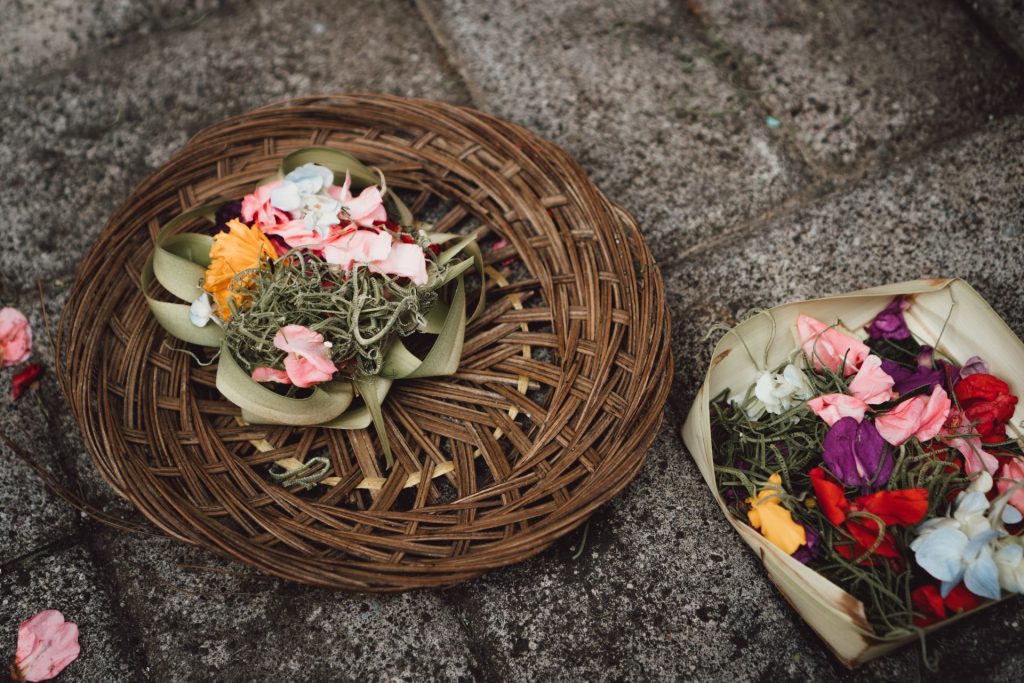
Going deeper into the subject uncovers other claims that have been made in favour of the practice. Many believe that it may grant newlyweds happiness; ensure a bright, clear sky on the wedding day; and the attending guests would be on their best behaviour. There are even talks of it having the power to ward off bad luck and dispel evil spirits delivered via black magic. This is where custom and religion reach a stalemate.
“Mandi bunga draws from the animism, dynamism, and Hindu-Buddhist beliefs that give credence to spirits and that goes against the teachings of Islam,” said Siti. She then recalled coming across disturbing anecdotes where people would perform the ritual under the bridge to hasten the process of finding love. That said, she mentioned that Muslims could practise the tradition with the right intention—they must not believe in other entities but the Almighty.
Mandi bunga combines elements from the bountiful nature and extracts all of their salubrious properties. The Malay community commonly uses seven or nine types of flowers including rose, michelia, ylang-ylang, frangipani, hibiscus, quisqualis, and bakula tree. All of them must be freshly picked, have pleasing scents, and be without thorns. A bottle of rose water and a couple of kaffir limes go a long way even though they are non-compulsory.
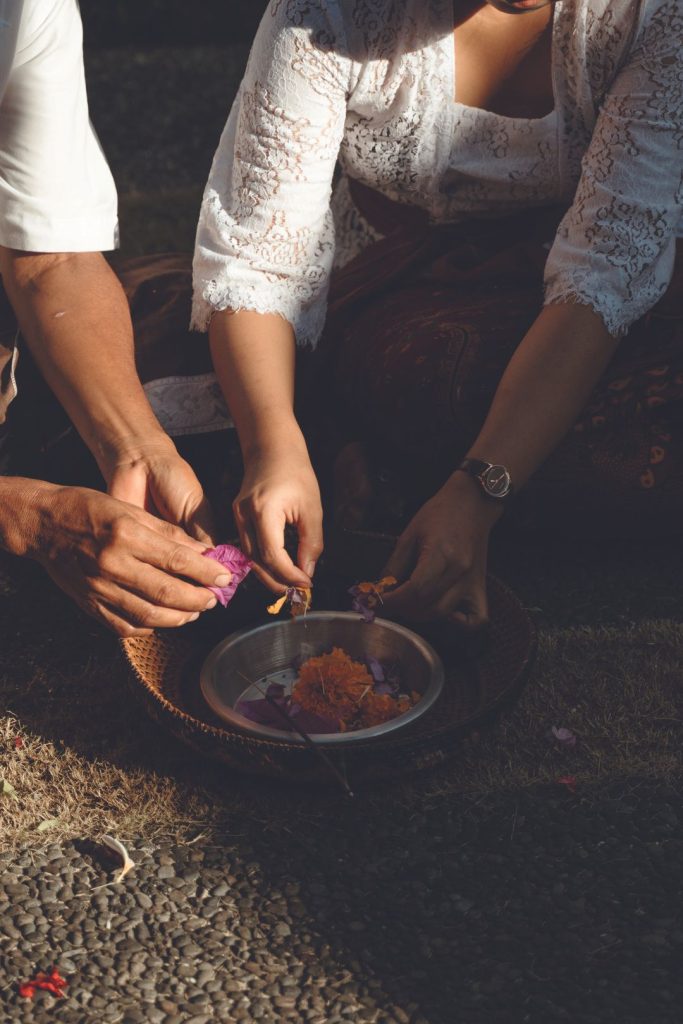
Similarly, thoughtful processes apply when it comes to the prep work that ensues. One must first cut the leaves and stems off the flowers before submerging them into the water—mixed with rose water and cut kaffir limes for good measure—in a tempayan. Recite the prayers, set the intention, and let it sit overnight. According to Siti, mandi bunga is best carried out early in the morning and after the body is properly scrubbed.
“It is actually the last part of the cleansing process,” she said. “Mandi bunga begins with a prayer recital. Afterwards, a midwife or shaman would pour the water on the left side of the body three times, on the head three times, and on the rest of the body until the stoneware jar is emptied,” she explained. Siti then added that the participant should bask in the floral scents for a good while and let them infuse their body.
“These days, they are soaked in the bathtub with novel ingredients like milk added to the equation,” she continued. Siti went on to say that she would disagree with the notion that the new way of mandi bunga is better. With the additional fixings and different ways the ritual is performed, she felt like today’s mandi bunga lacks identity and authenticity. “I think the tradition is going to be rendered obsolete,” she contemplated.
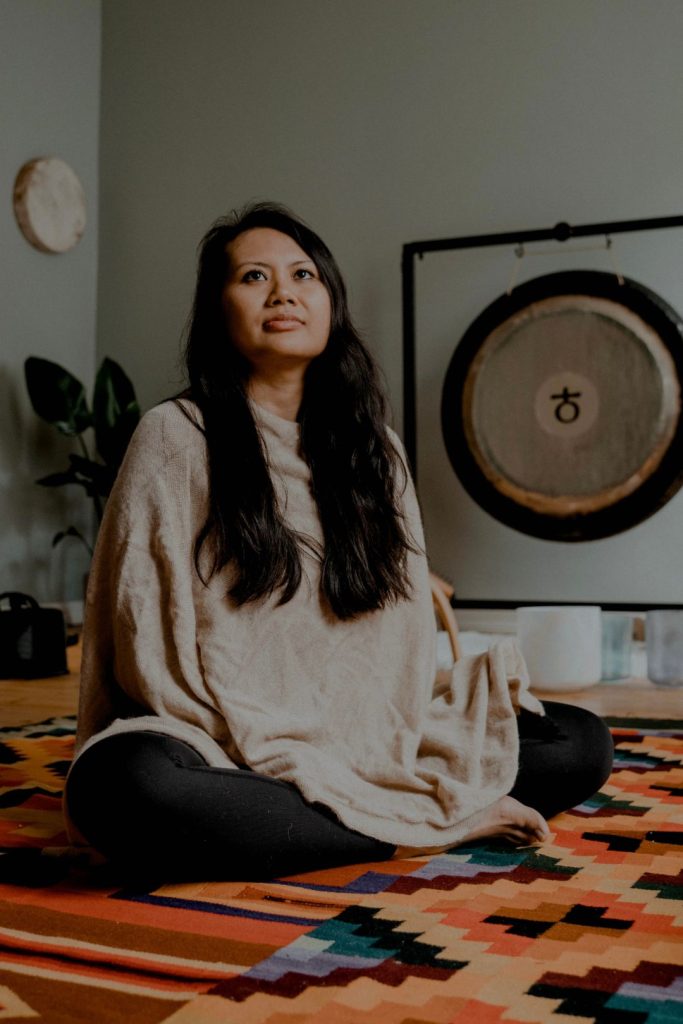
A thoughtfully hewn practice that has stood the test of time is now feared to be losing its place in the modern world. It all sounds so familiar. The influence of mandi bunga is said to be diminishing due to the commercialisation of the ritual and the rise of technology—who cares about some old- school mumbo jumbo when you can get those lines zapped up with laser treatments and injectables? But is it all doom and gloom? Suraya Sam lights a flicker of hope.
The plant medicine practitioner believes that the mandi bunga ritual is, as a matter of fact, making a comeback. “I have been doing this most of my life and I can sense that people have started appreciating the tradition as I grow older,” she said. Suraya then added that the reason for the promising uptick is the growing realisation that nature allows us to be in harmony with who we are in ways that technology doesn’t.
“Technology is invaluable for convenience but not as a heartfelt experience,” she added. “I want to let people know that it’s not necessarily a religious practice, it can just be for self-care practice,” she said, a philosophy that is reflected in House of Ascend that she co-created where she reintroduces sacred practices including mandi bunga and incorporate them with sound, aromatherapy, breath work, and somatic yoga in a 90-minute session.
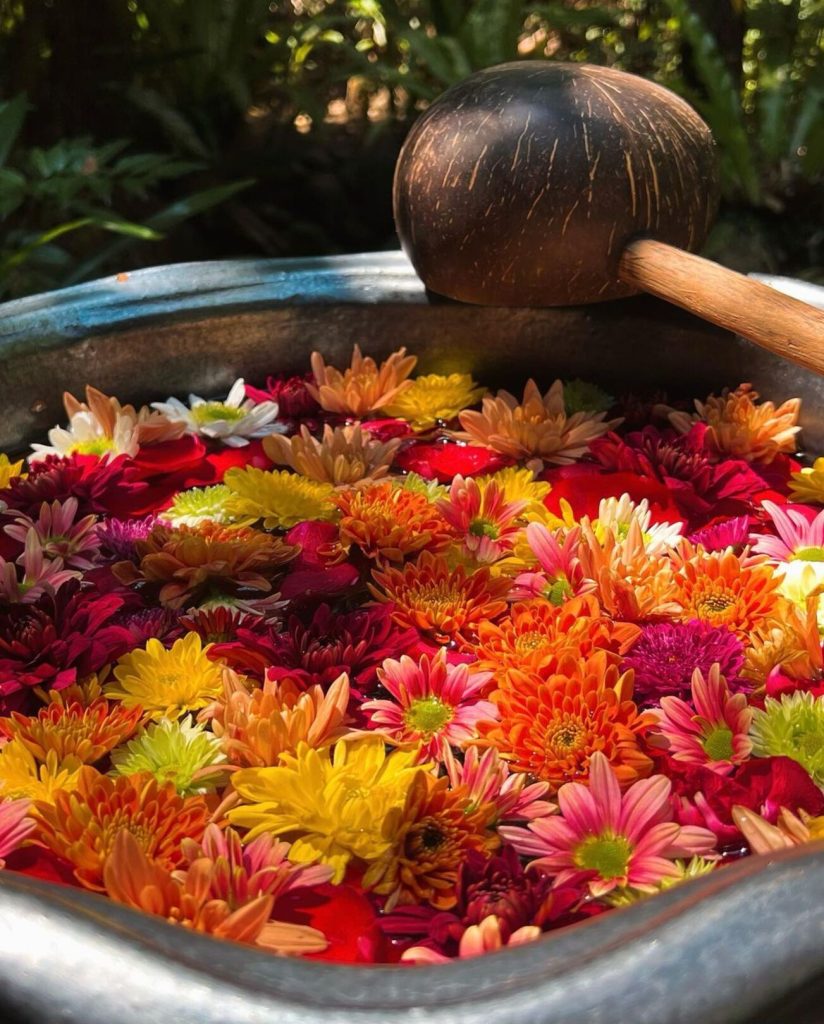
Inheriting the savoir-faire in mandi bunga from her grandparents, Suraya believes that her role in this ephemeral life is to simply remind the people of the wisdom that our elders left behind. “My grandfather used to ask my grandmother to pick some flowers every Thursday, ahead of Friday prayer, for this sort of cleansing ceremony,” she recalled, adding that her grandmother would come back with a whole lot of jasmines, orchids, and calendulas.
“I remember he would put all the flowers in a huge bowl and read surahs to alchemise them,” she said. Suraya, who was no older than eight years old, would then be sent to the bathroom with her grandmother. “That’s when I learned about mandi bunga; you lather your skin with the flowers and kaffir limes that have been cut into dice and imagine that all the impurities in your body are energetically and physically absorbed by them,” she added.
When it comes to the dos and don’ts, Suraya said that there are certain ways to dispose of the used flowers. “I would collect all the petals and put them on banana leaves before getting rid of them after the Friday prayer,” she said. There are three ways that she could do it: cast them into the sea (sans banana leaves), bury them at the park, or burn the dried-out petals in a fire ceremony. “It’s what we do for an energetic cleanse. It’s very elemental,” she added.
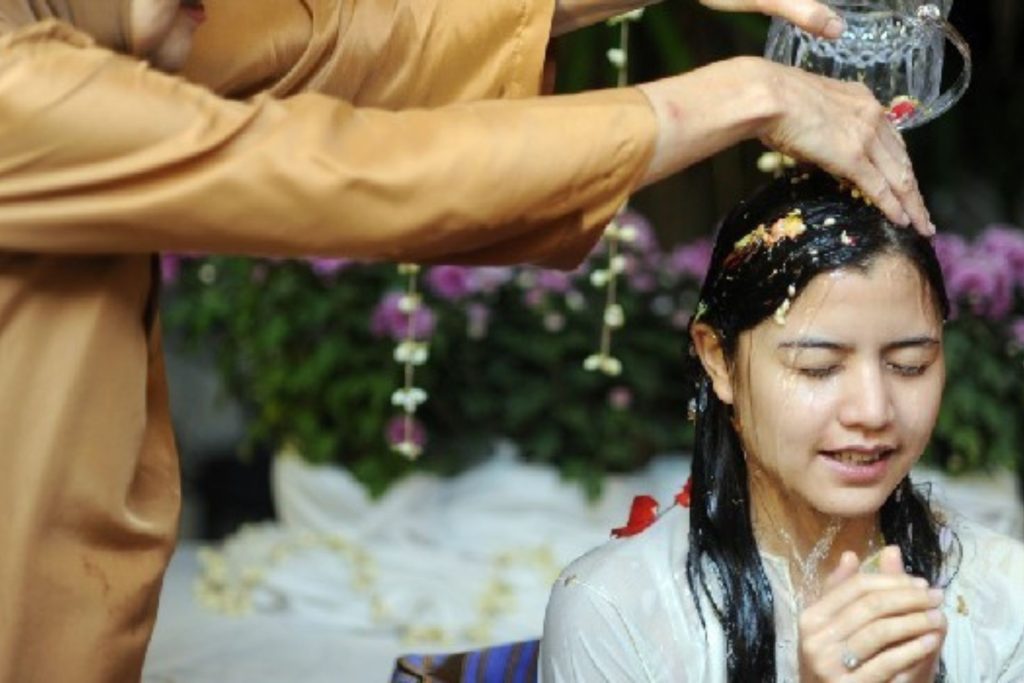
For all the talks about its use to elevate one’s beauty, mandi bunga also has been said to wield some healing powers. It has been found to help mental health problems such as depression by lowering the cortisol hormone (stress hormones) and increasing the feeling of comfort and the level of endorphins that provide a “feel-good” sensation. Suraya echoed the same sentiment, noting that some of the most reliable brands in the market today are reliant on floral extracts.
“I do believe in the power of flower medicine and plant medicine at large. You smell lavender and it relaxes you; you smell peppermint and it opens up your passageway; and you seek peppermint eucalyptus if you have sinus or a cough,” she said. “Even mainstream brands such as Vicks use botanical essences if you look at the ingredients. They are scientific; you just have to read what’s on the box or the bottle,” she added.
Indeed, the plants’ profound health benefits have been well documented and mandi bunga is one of the oldest customs that has been capitalising on the wealth of the land. It’s a sacred practice worth preserving for the younger generation. Especially in the age where our self-worth could depreciate with a touch of a button, it would do us all good to take a beat from time to time and let the negativity wash away with some psychedelic, sweet-smelling petals.
